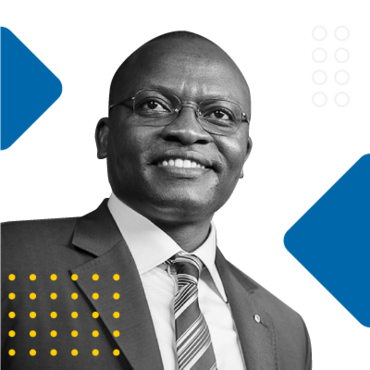Clemence Matsika
LAPTOP Scholar is frontline firefighter in Zimbabwe’s COVID-19 response
Interviewed in 2020
In Clemence Matsika’s world, supply chains make a difference between life and death. Zimbabwe is a country heavily dependent on imports of food, medicines, and infrastructure, Matsika explains, and this high dependency on imports presented a terrible challenge in March 2019 when Cyclone Idai hit. Idai is, to date, one of the worst tropical cyclones to affect Africa and the Southern Hemisphere, causing catastrophic damage and a humanitarian crisis in Mozambique, Zimbabwe, and Malawi, leaving more than 1,300 people dead and many more missing.
Idai is one of the worst tropical cyclones to have hit Africa
“We were too lax,” Matsika remembers. “We were not prepared enough, and we expected the cyclone would have become less severe by the time it hit Zimbabwe. But it rained for 24 hours, and the mudslides and flash floods swept some villages away, and completely buried others. We still haven’t recovered all the bodies; many were swept away in the floods,” he says.
Clemence Matsika’s organization — Smart Building Solutions — started getting urgent requests for prefabricated facilities made out of shipping containers, to serve as clinics, pharmacies, and patient accommodation, designed for use in remote areas with little access to hospitals. Fabrication began in Harare, and prefabricated units were transported to the Eastern Highlands in Manicaland, which had gone off-grid due to collapsed roads and bridges. Matsika worked with teams on the ground to provide turnkey kits, complete with generator or solar power, and utilities.
Matsika credits his training in humanitarian logistics for his success in his work. A LAPTOP Scholarship to help him complete a programme in Humanitarian Medical Logistics Practices with the Logistics Learning Alliance was vital, he says. “Though the course was distance learning, it felt exactly like a live session in humanitarian medical logistics; you’re on your computer, but you have to run a case study exactly like you’re in a real-life situation. It prepared me well for the issues I am now facing every day. Had I not received that training, I would still be in admin.”
Had I not received this scholarship, I would still be in admin.
Unfortunately, Cyclone Idai was not the last crisis to demand Matsika and his coworkers’ urgent attention. COVID-19 hit the country, and on March 27th, the entire country went into total lockdown, but Matsika continued to work. “We were part of five-member team called to remodel an entire building into a hospital. Our team spent days trying to source materials including hospital beds for a COVID unit. When we finally found beds in South Africa, we had to ship them and get clearance from the Ministry of Health and all relevant authorities — all this under lockdown. Also, businesses were calling for their own COVID-screening units and we had to build several units in record time. Today, the brand-new HealthPoint COVID-19 Treatment Centre in Harare provides state-of-the-art coronavirus treatment.
The process was not in the least straightforward, Matsika recalls. “In Zimbabwe, we are still working on our transport corridors as roads and systems are being upgraded to international standards. Delays are common. This is further complicated by the varying customs regulations and checking systems in neighbouring countries; the usual excuse for delays is: ‘your papers are not in order’. Government bodies take time to process things, and you must always be prepared with every little thing they might ask you for. Also, always have a backup plan to avoid delays and penalties; they can be very frustrating,” he says.
The usual excuse is ‘your papers are not in order’.
But despite the stresses and frustrations, Matsika does not envisage working anywhere else and will gladly take on all the challenges for the satisfaction of having affected lives positively. “Someday, someone will thank me for the work I have done in building our infrastructure. They will find a prefabricated clinic in a very remote area and thank the people who worked against the odds to get that unit set up. A highlight for me is turning on the television and watching handover ceremonies for one of our countrywide projects. I see communities dancing and celebrating, and I know that is because of the hard work that my team and I have put in personally.
“That makes all the frustrations and struggles worthwhile.”

Someday, someone will thank me for the work I have done in building our infrastructure.


